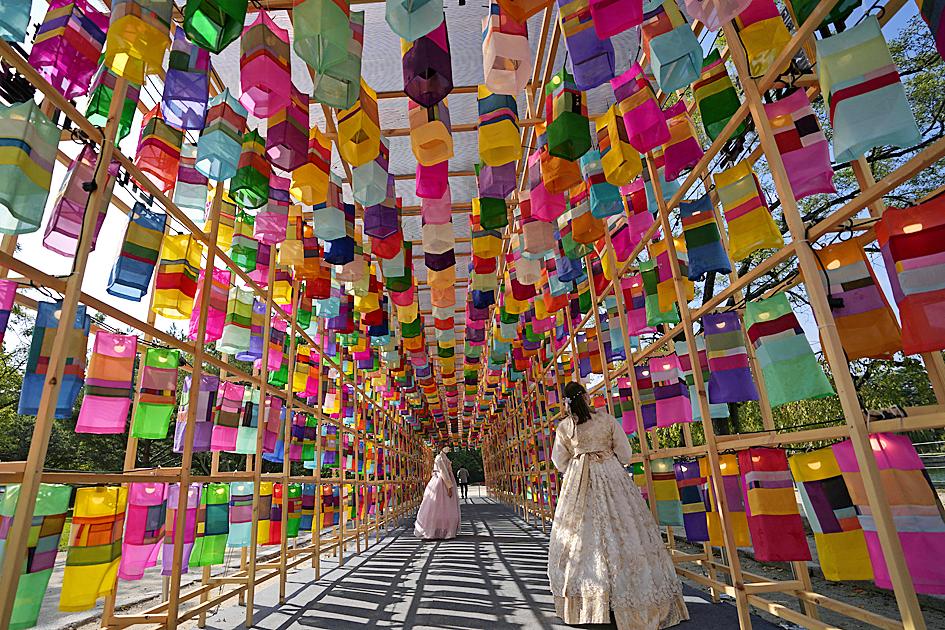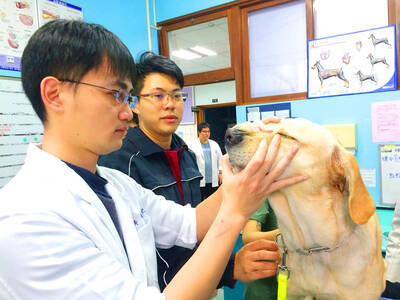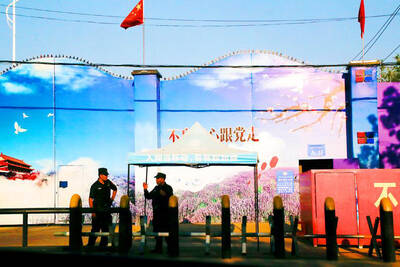Taiwan and South Korea aim to increase the number of tourists traveling between the two countries to 3 million, government and tourism industry representatives said at a conference in Hsinchu City yesterday.
The annual event was attended by Deputy Minister of Transportation and Communications Chen Yen-po (陳彥伯); Tourism Bureau Director-General Chang Shi-chung (張錫聰); Taiwan Visitors Association chairwoman Yeh Chu-lan (葉菊蘭); South Korean Representative to Taiwan Chung Byung-won; Yoon Ji-sook, an official at the South Korean Ministry of Culture, Sports and Tourism; and Korea Association of Travel Agents chairman Oh Chang-hee.
Global tourism is expected to soon rebound to between 55 and 70 percent of 2019 levels after growth in the first quarter of this year exceeded expectations, Yeh said, citing data from the UN World Tourism Organization.

Photo: AP
Although tourism in Asia has recovered slower than elsewhere, many tourist destinations in Asia have gradually lifted travel restrictions, Yeh said.
“Prior to the COVID-19 pandemic, the number of tourists traveling between Taiwan and South Korea had grown annually,” she said. “The conference will surely lay a good foundation for the reopening of tourism exchanges between the two countries.”
Seoul has eased quarantine requirements for international travelers and on June 1 began accepting applications for tourism visas.
The main goal of the conference is to talk about practical ways to boost traveler numbers between the two countries to 3 million next year, Oh said.
Taiwan has many tourist attractions that South Korean travelers like to visit, and vice versa, he said, adding that the two countries should take into account the latest tourism trends and prepare for the arrival of visitors.
Chung said the conference would define the criteria for hosting physical meetings between tourism representatives in the post-pandemic era.
“Through the efforts of travel agents in both countries, we hope that travelers could reach 3 million next year and 5 million in 2023,” he added.
Yoon said the tourism industry has increasingly digitalized over the past two years, with more tourists preferring to travel independently than joining tour groups.
Chen said the Tourism Bureau has identified six scenic areas across the country — Nantou County’s Sun Moon Lake (日月潭), Alishan (阿里山), Penghu County, the north coast, the northeast coast and the east coast — as tourism focus areas.
“The bureau has also organized 16 cycling tour routes,” Chen said. “We want to tell the world that Taiwan is ready to host international visitors.”
In other news, the number of air travelers arriving at or departing from Taiwan Taoyuan International Airport is expected to reach close to 2 million this year, as the government has gradually eased disease prevention measures for inbound travelers, Taoyuan International Airport Corp said yesterday.
The pandemic has caused the number of air travelers accessing the nation’s largest airport to drop from about 48 million in 2019 to about 909,000 last year, the airport operator said.
However, the airport has seen a slow, but steady return of air travelers since June 15, when the Central Epidemic Command Center eased the quarantine requirement to three days followed by four days of disease self-monitoring.
On Wednesday, 10,047 air travelers accessed the airport, the first time that the daily number of travelers exceeded 10,000 since April 2020, the company said.
The airport’s passenger volume reached 530,000 from January to May, marking a growth of 37.7 percent compared with the same period last year, it said.
Eased disease prevention measures are expected to boost the number of air travelers at the airport to 1.93 million by the end of this year, it said.

Former Czech Republic-based Taiwanese researcher Cheng Yu-chin (鄭宇欽) has been sentenced to seven years in prison on espionage-related charges, China’s Ministry of State Security announced yesterday. China said Cheng was a spy for Taiwan who “masqueraded as a professor” and that he was previously an assistant to former Cabinet secretary-general Cho Jung-tai (卓榮泰). President-elect William Lai (賴清德) on Wednesday last week announced Cho would be his premier when Lai is inaugurated next month. Today is China’s “National Security Education Day.” The Chinese ministry yesterday released a video online showing arrests over the past 10 years of people alleged to be

THE HAWAII FACTOR: While a 1965 opinion said an attack on Hawaii would not trigger Article 5, the text of the treaty suggests the state is covered, the report says NATO could be drawn into a conflict in the Taiwan Strait if Chinese forces attacked the US mainland or Hawaii, a NATO Defense College report published on Monday says. The report, written by James Lee, an assistant research fellow at Academia Sinica’s Institute of European and American Studies, states that under certain conditions a Taiwan contingency could trigger Article 5 of NATO, under which an attack against any member of the alliance is considered an attack against all members, necessitating a response. Article 6 of the North Atlantic Treaty specifies that an armed attack in the territory of any member in Europe,

LIKE FAMILY: People now treat dogs and cats as family members. They receive the same medical treatments and tests as humans do, a veterinary association official said The number of pet dogs and cats in Taiwan has officially outnumbered the number of human newborns last year, data from the Ministry of Agriculture’s pet registration information system showed. As of last year, Taiwan had 94,544 registered pet dogs and 137,652 pet cats, the data showed. By contrast, 135,571 babies were born last year. Demand for medical care for pet animals has also risen. As of Feb. 29, there were 5,773 veterinarians in Taiwan, 3,993 of whom were for pet animals, statistics from the Animal and Plant Health Inspection Agency showed. In 2022, the nation had 3,077 pediatricians. As of last

XINJIANG: Officials are conducting a report into amending an existing law or to enact a special law to prohibit goods using forced labor Taiwan is mulling an amendment prohibiting the importation of goods using forced labor, similar to the Uyghur Forced Labor Prevention Act (UFLPA) passed by the US Congress in 2021 that imposed limits on goods produced using forced labor in China’s Xinjiang region. A government official who wished to remain anonymous said yesterday that as the US customs law explicitly prohibits the importation of goods made using forced labor, in 2021 it passed the specialized UFLPA to limit the importation of cotton and other goods from China’s Xinjiang Uyghur region. Taiwan does not have the legal basis to prohibit the importation of goods